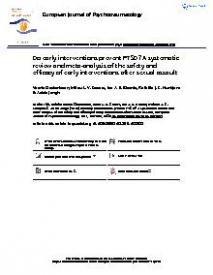Do early interventions prevent PTSD? A systematic review and meta-analysis of the safety and efficacy of early interventions after sexual assault
Objective: To review the safety and efficacy of early interventions after sexual assault in reducing or preventing posttraumatic stress disorder (PTSD).
Method: Systematic searches were performed on studies (1980–2018) that examined the efficacy of interventions for PTSD within 3 months after sexual assault.
Results: The review identified 7 studies (n = 350) with high risk of bias that investigated 5 interventions. Only two studies reported on safety. Contact with the authors of six studies provided no indications for the occurrence of adverse events. Two studies reported the efficacy using PTSD diagnosis as dependent variable but found no difference between groups. All studies reported on efficacy using PTSD severity as dependent variable. For the meta-analysis, 4 studies (n = 293) were included yielding significantly greater reductions of PTSD severity than standard care at 2 to 12 months follow-up (g = −0.23, 95% CI [−0.46, 0.00]), but not at 1 to 6 weeks post-intervention (g = −0.28, 95% CI [−0.57, 0.02]). The heterogeneity of the interventions precluded further analyses.
Discussion: Findings suggest that early interventions can lead to durable effects on PTSD severity after sexual assault. However, due to limited availability of data, it is impossible to draw definite conclusions about safety and efficacy of early interventions, and their potential to prevent PTSD.
Geachte bezoeker,
De informatie die u nu opvraagt, kan door psychotraumanet niet aan u worden getoond. Dit kan verschillende redenen hebben,
waarvan (bescherming van het) auteursrecht de meeste voorkomende is. Wanneer het mogelijk is om u door te verwijzen naar de bron
van deze informatie, dan ziet u hier onder een link naar die plek.
Als er geen link staat, kunt u contact opnemen met de bibliotheek,
die u verder op weg kan helpen.
Met vriendelijke groet,
Het psychotraumanet-team.
In: European Journal of Psychotraumatology, ISSN 2000-8066 | 10 | 1 | 1682932
https://www.tandfonline.com/doi/full/10.1080/20008198.2019.1682932


